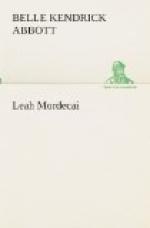“Good morning, Maum Cinda.”
“Good-by, young ladies, good-by.” And the last glimpse the two receding friends had of the old woman, she was still profoundly bowing and courtesying in acknowledgment of their remembrance.
Then the friends parted for the day, each one taking the most direct course to her home, and soon both were safely sheltered from the drizzling rain and chilling wind.
CHAPTER II.
Two pale lilies and two royal roses upon a stem, would scarcely form a more beautiful or striking group than did the four maidens standing together under the stone archway of the school-room, on that gloomy day at Madam Truxton’s.
The fair hair and blue eyes of Helen Le Grande and Lizzie Heartwell distinctly contrasted with the jetty locks and eyes of Bertha Levy and Leah Mordecai—the beauty of neither style being in any degree marred by such close contact.
The blonde beauty of the first two maidens bespoke their unmistakable Anglo-Norman blood and Christian descent, while the opposite cast of the others testified to their Jewish origin.
A casual observer even, would have decided that these four maidens were bound together by an unusual bond of friendship—an incongruous friendship it might have seemed, and yet it was not such.
Helen Le Grande, the eldest of the group by a few months, was scarcely eighteen years of age, as bright and gay a maiden as one could find in all the land, and the only daughter of Judge Le Grande, a lawyer of wealth and distinction.
Of immediate French descent, Judge Le Grande possessed in an eminent degree the peculiarities of his gay, volatile ancestry. Proud of his children, and ambitious for their future, in his lavish bounty he withheld nothing he deemed necessary for their advancement in life.
Thus at eighteen, Helen Le Grande looked out upon life’s opening sky as thoughtlessly as she would look upon the bright waters of the blue harbor that stretched before her father’s mansion, where sky and water blended in a peaceful, azure expanse, little heeding or caring whether storms came, or sunshine rested on the deep. Bertha Levy, the little darked-eyed Jewess who stood by her side under the stone archway, was nothing more or less than a piquant little maiden, just turned seventeen, of amiable disposition and affectionate heart, but by no means partial to study, and always ready to glean surreptitiously from her books, any scraps of the lesson that might be useful, either to herself or her friends, in the ordeal of recitation.
Bertha’s mother was a widow, whose circumstances allowed her children all the comforts and even many luxuries of life. She had reared them most rigidly in Hebrew faith. Lizzie Girardeau Heartwell, the next in the fair tableau, was the only member of the group who was not a native of the Queen City. It is no misstatement of fact to say that she was, indeed, the ruling spirit of Madam Truxton’s entire school.




